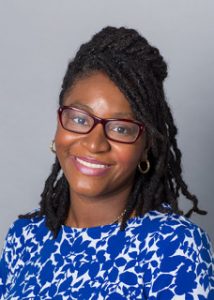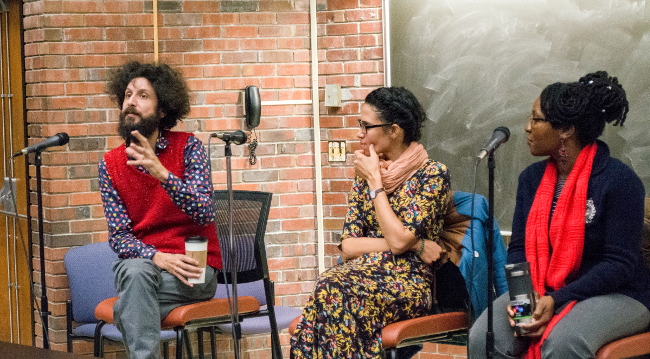Without Limits Speakers Engage in “Uncomfortable Conversations” about National and Academic Citizenship
The first event in this year’s “Without Limits: Interdisciplinary Conversations in the Liberal Arts” series raised important questions about how citizenship—both in the U.S. and our campus community—is defined, whom it excludes or marginalizes, and how it might be reconceived through struggle and transformation.
Hosted by the College of Liberal Arts & Sciences, “Without Limits” is organized annually around a single, vital theme. The October event, “The Politics of Belonging: Reflections from New Paltz Faculty,” gave three assistant professors the opportunity to share their thoughts on this year’s theme of citizenship as it relates to undocumented immigrants, African-Americans, and women of color in the academy.
Speakers included César Barros (Languages, Literatures and Cultures; Latin American and Caribbean Studies), Nicole Carr (Black Studies, Latin American and Caribbean Studies; Women’s, Gender, and Sexuality Studies) and Sharina Maillo-Pozo (Languages, Literatures and Cultures; Latin American and Caribbean Studies; Women’s, Gender, and Sexuality Studies).
Citizenship as Politics

Barros framed his remarks by referencing the September rescission of the Deferred Action for Childhood Arrivals (DACA) program and the White House’s conditions for its reinstatement, which include a proposed wall on the U.S./Mexico border, the creation of new laws that make it easier to deport undocumented minors, and the construction of new detention spaces.
Barros asserted that these facts, coupled with the U.S.’s response to the hurricane-ravaged Puerto Rico, “all blatantly show the current structure of belonging in this country,” which he defined as principally nationalist in character. Within this framework, Barros asserted, citizenship produced belonging by erasing difference—in race, language, gender, sexuality, class, language—while externalizing this difference in the form of the alien.
Barros proposed an alternative conceptual framework, “citizenship as practice, as politics,” which demands transformation rather than inclusion. This framework finds expression in the celebrated intellectual, author, and civil rights activist W. E. B. Du Bois’ 1905 Niagara Movement speech, in which he said, “We claim for ourselves every single right that belongs to a freeborn American, political, civil and social; and until we get these rights we will never cease to protest and assail the ears of America. The battle we wage is not for ourselves alone but for all true Americans. It is a fight for ideals, lest this, our common fatherland, false to its founding, become in truth, the land of the thief and the home of the slave, a byword and a hissing among the nations for its sounding pretensions and pitiful accomplishment.”
Barros found contemporary echoes of Du Bois’ speech in former San Francisco 49ers quarterback Colin Kaepernick’s interrogation of the gulf between America’s ideals and racial realities, as well as the fearless, unapologetic claims to citizenship made by undocumented immigrants in the film “Undocumented and Unafraid,” which he excerpted.
“The door has already been traversed…she’s not asking for the static, American nation to be opened,” Barros said of the immigrant featured in the film’s clip. “She’s asking, while out, while in the open, here, for citizenship and its limits to be transformed so they may become what they should be.”
Citizenship, Barros argued, cannot be based on simple acceptance, rather it should be constantly constructed, analyzed, and fought for, so that a society can realize its true potential for community.
Citizenship as Exclusion

Arguing that “American citizenship is forged, predicated and sustained on anti-blackness,” Carr described lynchings as “spaces of belonging” for white audiences and revealed the hidden assumptions in the language used to describe the presidencies of Barrack Obama and Donald Trump.
In the post-Jim Crow south, whites flocked to see the sights of black men, women and children hanging from trees and telephone poles, and proudly reported back to their local communities all the gruesome details of what they observed. Carr described these gatherings as spaces of belonging structured along socioeconomic, gender and educational lines.
Northern whites who denounced lynchings were content to attribute the practice to the south’s “backwardness,” rather than addressing the nation’s structural racism, a phenomenon Carr likened to the “new master narrative” that attributes Donald Trump’s rise to the White House to his support among poor, uneducated whites.
Carr, referencing the work of author Ta-Nehisi Coates, said Trump’s supporters “ran the gamut of whiteness,” and by denying their part in Trump’s victory, liberal whites attempted to absolve themselves of their role in the anti-black structure of the nation.
Carr unpacked the meanings of three often-repeated political buzzwords, “post-racial,” “white lash,” and “normalize,” all of which she believes to be rooted in the “negation of black humanity.”
Saying that Obama’s victory as the first African-American president ushered in a post-racial era ignores the fact that a majority of white voters voted for opponents John McCain and Mitt Romney. Likewise, attributing Trump’s victory to white voters’ reaction to a loss of power and privilege presupposes that they actually lost power under the Obama administration, an idea Carr forcefully rejected.
Finally, to normalize Trump, one must first believe that Trump is abnormal or an aberration, a proposition Carr disputed, saying this was not the first time the nation elected a virulently racist president.
“Black people have always been living in the era of Trump,” Carr concluded. “It is as normal as the air we breathe and the water we bathe our children in. It is as normal as black men, women, and children hanging from trees and telephone poles in the post-Jim Crow south, so normal that Billy Holiday sang a song called ‘Strange Fruit.’”
Academic Citizenship

As the campus continues to grapple with issues pertaining to diversity and inclusion, Maillo-Pozo shared her personal experiences within the academy, a space she described as feeling unfamiliar to women of color.
“When we enter this world, we come with the awareness that this is quite foreign to us—that perhaps most of us women of color are the first to enter these academic spaces,” she said.
Maillo-Pozo’s students have questioned why she uses the title of “doctora” (doctor), falsely assuming that she has not completed her doctorate. Maillo-Pozo interprets this question as symptomatic of how students read her body as a woman and person of color, recognizing that she is an atypical citizen of the academy, which suffers from a lack of representation of faculty of color, and particularly, women of color.
Maillo-Pozo’s personal experiences shape her contributions to the academy. In her work, she seeks to shed light on little-known performers and intellectuals of color, primarily those who share her Dominican heritage. She champions efforts to bring diverse voices to campus—having organized many such events during her short tenure at New Paltz—and is a member of the campus’ Women of Color network.
As she addressed the structural inequalities that prevent women of color from feeling a sense of belonging within the academy, Maillo-Pozo offered the classroom as an example of a “space of empowerment” that should be replicated in both the academic community and society at large.
Maillo-Pozo shared the responses from a recent course assignment, in which she asked her students to reflect on what it means for them to be Latinx in their communities within today’s highly-charged political environment. The narratives, Maillo-Pozo said, were “not self-defeating,” but instead spoke of overcoming prejudices and achieving dreams unavailable to their parents.
“They conceptualized their being here at a higher education institution as an opportunity to change the narrative, as a way to belong and be part of places that their families could not access, as a way to become citizens and diverse voices of SUNY New Paltz,” she noted.
The students’ responses were to Maillo-Pozo a “confirmation that my presence and that of my fellow faculty of color and women of color here is necessary, a validation of the need to continue the efforts to diversify the faculty body and curriculum to foster a supportive environment for faculty and students.”
During the Q&A, Maillo-Pozo stressed the need for talking about “uncomfortable truths” when discussing campus citizenship. Seconding his colleague, Barros cautioned against complacency, saying citizenship must not “have the structure of a club.”
“If SUNY New Paltz is an institution with citizenship, it cannot be static; it should always become,” he said. “It should be a constant becoming and that means conversations, struggles, discussions, fights—maybe a little bit—but we can’t get comfortable. If we are too comfortable in a place…then there’s something wrong,” he said.
—
For more information about Without Limits, and to view a recording of the event, visit the Without Limits website.

